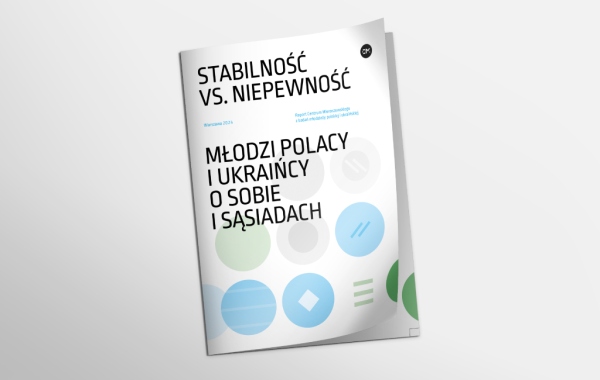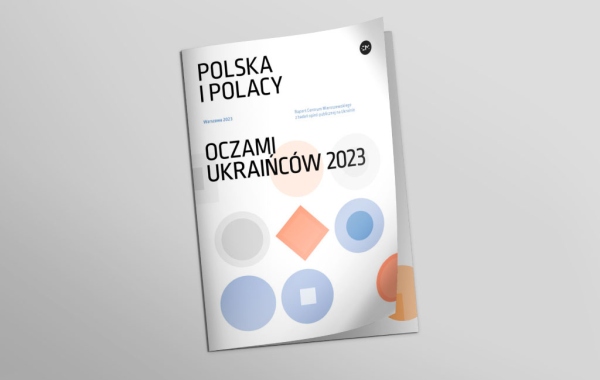Ukraine and Polish-Ukrainian relations as seen by Poles 2024
Since the Russian invasion of Ukraine in February 2022, Polish-Ukrainian relations and Poles' perception of Ukraine have become an important topic in Polish public debate. The report by the Mieroszewski Centre reveals changes in Polish public opinion on Ukraine and Ukrainians and presents a number of challenges facing the relationship between the two nations.
Changing public attitudes
At the beginning of the conflict, a strong wave of solidarity with Ukraine prevailed, which manifested itself in massive humanitarian aid and military support. Poles willingly accepted Ukrainian refugees, which had a positive impact on interpersonal relations and the building of social capital between the nations. However, two years after the outbreak of war, these emotions are beginning to change. Poles are increasingly expressing concerns about the prolonged conflict and its impact on the Polish economy and security.
Research conducted in seven focus groups and an online survey of a representative sample of 1002 Poles shows that the most common association with Ukraine is ‘war’, spontaneously recalled by 49% of respondents. Responses were varied, covering both positive and negative perceptions. In the quantitative survey, 27% of respondents had negative associations with Ukraine, while 25% expressed positive views. In the focus groups, negative associations regarding Ukrainians were more pronounced, with some opinions indicating a sense of disappointment at the lack of gratitude and the demanding attitude of some refugees.
The impact of disinformation and changing sentiments
One of the key elements influencing Polish attitudes is the information war waged by Russia. Russian disinformation activities effectively manipulate public emotions, leading to an increase in resentment towards Ukrainian refugees and negative opinions about Ukraine. The impact of this disinformation is particularly evident in social groups that get their information mainly from social media, where it is easy to create so-called ‘information bubbles’.
The report also notes that the prolonged war and the resulting challenges have begun to have a negative impact on the attitudes of Poles. Some 40% of respondents admit that their opinion of Ukrainians has changed since Russia's aggression against Ukraine, with the majority saying that this opinion has changed for the worse (25%) rather than for the better (14%). Respondents often pointed to growing war fatigue and the need for the Polish state to address its own internal problems as well, which often leads to less support for Ukraine.
Controversies and challenges in Polish-Ukrainian relations
Despite the earlier wave of support, Polish-Ukrainian relations face a number of challenges and controversies. The report points to the problem of economic conflicts, such as protests by Polish hauliers and farmers, which have led to tensions at the border. Another important issue is the unresolved historical disputes, including the Volhynian Massacre, which is still a source of tension and resentment on the Polish side.
In the context of the military and humanitarian aid provided, many respondents point to the need for a more considered and rational policy. 54% of respondents believe that the military support Poland provides to Ukraine should be continued, while 26% are against it. There are voices that the aid should be continued, but with more consideration for Polish interests and security.
The future of Polish-Ukrainian relations
The survey indicates a significant polarisation of opinion in Polish society on further support for Ukraine. Although the majority of respondents support Ukraine's integration into the European Union and NATO (63% support Ukraine's accession to the EU and 62% to NATO), this support is often made conditional on Ukraine fulfilling certain criteria, such as ending the war or resolving internal corruption problems.
In addition, Poles express concerns about the further integration of Ukrainians in Poland, and 44% of respondents believe that the scale of social assistance provided to refugees is too large. Among the demands are proposals for a more restrictive social policy, sustainable aid and supporting the integration of only those who are really willing and able to contribute to Polish society.
Summary
The opinion poll report shows the complexity and dynamic nature of Polish-Ukrainian relations. On the one hand, there is an apparent willingness to continue supporting Ukraine in its struggle for independence, while on the other hand, there are growing concerns about the costs of this assistance and the internal problems arising from the presence of a large number of Ukrainian refugees in Poland. It will be crucial for Polish decision-makers to find a balance between support for Ukraine and protection of Polish interests, which will require both wise leadership and effective public communication.
















